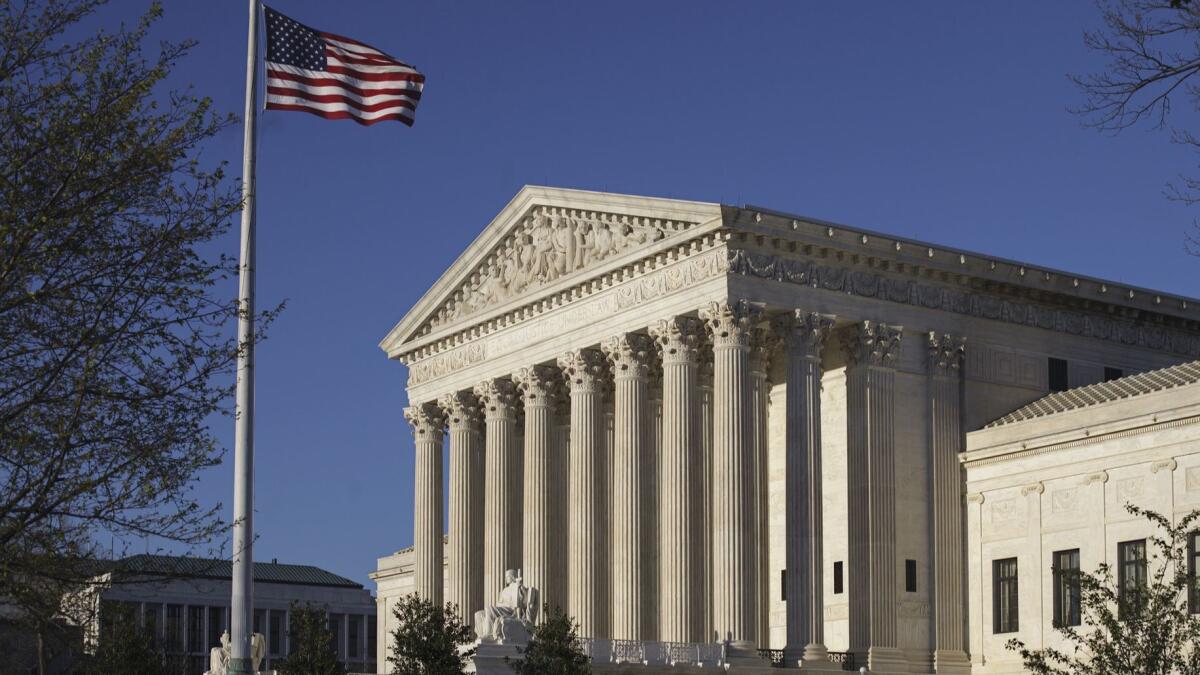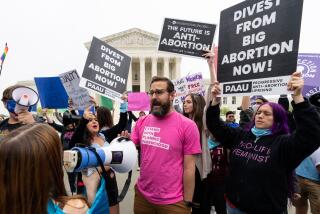Kavanaugh and Roberts join liberals to reject Planned Parenthood case

- Share via
Reporting from Washington — The Supreme Court signaled Monday it is not anxious to revisit the abortion controversy in the year ahead, disappointing conservative activists who were cheered by the appointment of Justice Brett M. Kavanaugh.
After weeks of debate behind closed doors, a divided court turned down appeals backed by 13 conservative states that sought to defund Planned Parenthood.
The court’s action leaves in place federal court rulings in much of the country that prevent states from denying Medicaid funds to women who go to a Planned Parenthood clinic for healthcare, including medical screenings or birth control. It is already illegal in most cases to use federal money like Medicaid to pay for abortions, but some states wanted to go further, cutting off all Medicaid funding to Planned Parenthood because the organization offers the procedure using alternative revenue sources.
In dissent, Justice Clarence Thomas, joined by Justices Samuel A. Alito Jr. and Neil M. Gorsuch, accused their colleagues of allowing a “politically fraught issue” to justify “abdicating our judicial duty.”
The lower courts are divided on the Medicaid funding dispute, making the high court’s refusal to clarify the issue all the more surprising to some.
“We created the confusion. We should clear it up,” Thomas wrote in Gee vs. Planned Parenthood. “So what explains the court’s refusal to do its job here? I suspect it has something to do with the fact that some respondents in these cases are named ‘Planned Parenthood.’ ”
The brief order denying the appeals from Louisiana and Kansas suggests Chief Justice John G. Roberts Jr. and Justice Kavanaugh were not willing to hear the cases.
The high court’s refusal to hear an appeal petition is not a ruling, and it will not prevent the justices from taking up the issue in the future or ruling against Planned Parenthood eventually.
Kavanaugh’s vote against hearing the case was noteworthy since it was his first abortion-related case, but it does not necessarily reflect how he would rule in future cases. Many legal experts predict Kavanaugh would vote to restrict or overturn the landmark Roe vs. Wade abortion ruling.
For now, however, the chief justice may have preferred to avoid controversies that result in a 5-4 split along ideological lines, particularly in the aftermath of the fierce partisan fight over Kavanaugh’s confirmation. Last month, Roberts objected to President Trump’s criticism of an “Obama judge” and issued a statement saying, “We do not have Obama judges or Trump judges, Bush judges or Clinton judges.”
Even so, if the court had agreed to decide the Medicaid dispute, the justices could well have split along the usual conservative versus liberal lines, with the five Bush or Trump appointees on one side and the Clinton and Obama appointees on the other side in dissent.
In their appeals, lawyers for Kansas and Louisiana pointed to a recent split among the U.S. appeals courts. Last year, the U.S. 8th Circuit Court of Appeals in St. Louis, breaking with others, upheld Arkansas’ decision to cut off funding to Medicaid to Planned Parenthood clinics.
It takes four justices to hear a case, and these appeals were considered in a series of closed-door meetings since late September. But the court’s conservatives were unable to gain the needed fourth vote. Kavanaugh took his seat in the second week of October, and his supporters have assumed he would vote in favor of restricting abortion rights when given the opportunity.
Catherine Foster, president of Americans United for Life, said her group was disappointed with the court’s action. “We join the dissent in calling on the court to do its duty,” she said.
“The pro-life citizens of states like Kansas and Louisiana, through their elected representatives, have clearly expressed their will. They do not want Medicaid tax dollars used to prop up abortion businesses like Planned Parenthood,” said Marjorie Dannenfelser, president of the Susan B. Anthony List, an antiabortion nonprofit. “The pro-life grass roots will not stop fighting until every single tax dollar is untangled from the abortion industry.”
Planned Parenthood called the outcome a victory for patients. “As a doctor, I have seen what’s at stake when people cannot access the care they need, and when politics gets in the way of people making their own healthcare choices,” said Dr. Leana Wen, the group’s president. “We won’t stop fighting for every patient who relies on Planned Parenthood for life-saving, life-changing care.”
In the last decade, conservative states have sought to defund Planned Parenthood because it is the nation’s largest single provider of abortions. None of the Medicaid money pays for abortions, and most of the state funding bans have been blocked by federal judges.
Medicaid is jointly funded by the federal government and the states, and Congress has said its funds may not be used to pay directly for abortions, except when the woman’s life is in danger or in cases of rape or incest. But more than 2 million people go to Planned Parenthood clinics for birth control and general healthcare, including cancer screenings and pregnancy tests. And for low-income women, this healthcare can be paid for through Medicaid.
Republican lawmakers who sponsored the defund laws argue the states should not indirectly subsidize facilities that perform abortions.
But lawyers for Planned Parenthood and their patients have gone to federal courts and won rulings blocking most of the laws from taking effect. They have done so by relying on a provision in the Medicaid Act that says eligible patients may go to any doctor’s office, hospital or clinic that is “qualified to perform” the required medical services. If a federal law creates a right for individuals, plaintiffs like the Planned Parenthood patients may go to court and sue if that right is denied.
But in their appeals, lawyers for Kansas, Louisiana and 13 other states argued that Medicaid is a healthcare spending agreement, not a law that establishes rights for individuals. If so, they said, states may decide who is a qualified provider of healthcare.
More stories from David G. Savage »
Twitter: DavidGSavage
More to Read
Get the L.A. Times Politics newsletter
Deeply reported insights into legislation, politics and policy from Sacramento, Washington and beyond. In your inbox twice per week.
You may occasionally receive promotional content from the Los Angeles Times.











